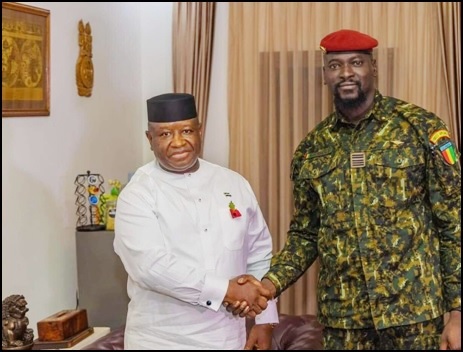A buffer is being constructed at Yenga town in Kailahun district by the Guinean government to fend it off from Sierra Leoneans. The town, according to a reliable source, has been sold to Guinea for arms and ammunition although the documentation is yet to be completed.
Guineans hope to take complete control of Yenga once the documents are processed and handed over to them.
Speculations about whether the Guinean authorities will get the documents continue as approval must be sought from parliament. A big hurdle stands along Bio’s way as a one-party parliament cannot approve such agreement, a situation that compelled him to appeal to APC (All People’s Congress) parliamentarians to take their seats in the legislative house.
The current parliament is presided over by only members of the ruling Sierra Leone People’s Party (SLPP) with an imposed speaker of parliament, Dr Abass Bundu.
The main opposition, APC still tenaciously maintain their boycott of parliament saying Bio did not win the elections, and, they have vowed not to go to parliament until he steps aside.
Government will fail big time in the trade of Yenga if the document is not debated and approved by a hybrid parliament: a parliament in which opposition parliamentarians are present.
The Guineans have a fear: the fear that another party comes to power tomorrow and nullify the agreement on the basis that it was not legal as it was not properly debated.
From a political standpoint,
It is clear that President Bio is not properly seated in light of the June-24 elections.
What about if he is removed from power or lose the re-run election set to be conducted soon.
The failure to surrender relevant documents to the Guinean authorities have led to a strained relationship between Guinea and Sierra Leone. The Guinean military Head of State, Colonel Mahmady Doumbouya is reportedly not happy with President Bio over the delay in processing the documents.
Quite recently, the Guinean Head of State threatened to enter Sierra Leone if government drags its feet in processing the documents.
President Bio, over a week ago, crossed over to Guinea to see President Doumbouya with whom he held closed door talks. Sources however told this press that the talks were not too far from the documents in respect of Yenga.
At the moment, Doumbouya still waits to see action by Sierra Leone government about Yenga town.
Wonders about how Yenga town falls into the hands of the Guineans still persist to date.
Many Sierra Leoneans confirmed that the Yenga stalemate began years back under President Ahmad Tejen Kabba who, many said, compensated the Guineans for their military role in the restoration of peace and democracy in Sierra Leone.
Guinean army played a decisive role in bringing peace to Sierra Leone especially when
Kabba was toppled by the armed forces in May, 1997.
Guinean soldiers who took charge of Yenga in the war years did not return to Guinea even after the war came to an end.
The move created a situation in which Yenga many people thought that Yenga belonged to Guinea.
Kabba, under whose reign Yenga was claimed, went out of power leaving the problem unsolved.
Former President Ernest Bai Koroma too played his own part to ensure that Yenga forms part of Sierra Leone’s territory. During Koroma’s tenure, talks between Guinea and Sierra Leone was already at an advanced stage when the army took over power in a coup d’etat.
Many Sierra Leoneans who are unaware of the collapse of negotiation had a general feeling that Yenga had been liberated although the problem still remained unabated.
The rise of Professor Alpha Conde to the Presidency raised new hope for Sierra Leoneans but he too was shortly overthrown by the ‘khaki’ boys leaving the problem still unresolved.
New hope was raised among Sierra Leoneans following the election of President Julius Maada Bio in March, 2019.
Bio, who many hope to relieve Yenga, failed in this venture.
Instead of liberation, Sierra Leoneans heard about an alleged sale of the eastern town to Guineans.
This is not the first time President Bio faces allegations of selling the country’s property.
Bio was accused of selling Sierra Leonean passports to foreigners when he was head of the defunct NPRC (National Provisional Ruling Council) regime.
Like Yenga, the passports were exchanged for arms and ammunition to prosecute the country’s decade-long civil war.
It was an allegation Bio admitted during a BBC interview on the eve of 2018 elections.
He however took responsibility and apologised to the people of Sierra Leone.
Bio’s frank admission and crave for indulgence appears to be a mere ploy to convince and canvass Sierra Leoneans for votes.
The latest allegation shows that Bio has gone back to his old tricks despite the apology made years back.
For now it is not clear where the stand-off between Guinea and Leone would end.
About two weeks ago, Guinea acted tough on Sierra Leone by imposing sanctions, a move that worsened an already polarised situation. According to the sanctions, 15 of Guinea’s products could not enter Sierra Leone, and the pinch is currently felt here.
Many Sierra Leoneans saw the sanctions as a way Guinea joining the international community to reverse the electoral coup in Sierra Leone. Others said the Guinean leader took such giant step to send a loud and clear message to Sierra Leonean authorities that he needs the documents for Yenga.
Is Yenga Town Sold For Arms?


